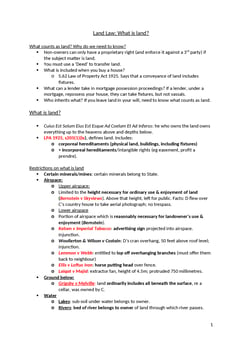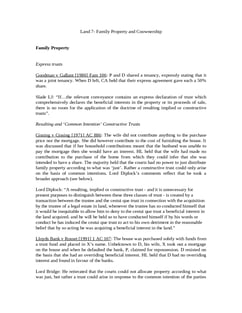Moncrieff v Jamieson [2008] CLJ 20
Judgement for the case Moncrieff v Jamieson
KEY POINTS
This case centers on an easement dispute involving parking rights linked to a vehicular access servitude. It hinges on whether parking is a natural extension of the access servitude, delving into property law intricacies. The core issue is the relationship between these two property rights.
The legal dispute boils down to how vehicular access servitude and parking rights interact. The court must scrutinize historical context, legal precedents, and specific easement terms to resolve this complex matter. The case's outcome will establish a crucial legal precedent and provide clarity for similar property rights disputes, carrying significant implications for property owners and legal professionals.
FACTS
The pursuers owned land by the sea, with a cliff on one side and the only access via a stairway to the top of the cliff. They had a legal right to cross the J family's land to reach a public road 150 yards away.
They used this path for cars and had a dispute about parking there. The sheriff ruled they could park as part of their access rights.
The J family appealed but lost in the Inner House of the Court of Session. They then appealed to the House of Lords.
Both parties agreed on the original access rights, covering both pedestrian and vehicle use, including stopping for various purposes.
JUDGEMENT
In Scottish law, it was possible to establish a right to park as ancillary to servitude of vehicular access.
A servitude was intended to facilitate the reasonable and comfortable enjoyment of the dominant tenement, and the test for ancillary rights revolved around whether they are necessary for the comfortable use and enjoyment of the servitude.
In this case, a unique circumstance existed where parking a vehicle on the dominant tenement was impossible. Without the right to park, the effectiveness of the proprietor's vehicular access right would be nullified.
Consequently, given the distinctive and exceptional circumstances, the rights associated with the express grant of a right of access for the dominant tenement encompassed the right to park vehicles on the servient tenement as long as it was reasonably incidental to the enjoyment of the dominant tenement.
The explicit grant of a servitude of access could implicitly include the right to park on the servient land if it was essential to make the servitude of access effective, to fulfill the purpose for which it was granted, or to secure an effective right of access.
Although the sheriff's test formulation was imperfect, he would have likewise considered that an implied right to park on the servient land was necessary to make the explicit grant of vehicular access meaningful.
COMMENTARY
M and his wife owned land in Shetland with limited land access due to a cliff. They acquired a right of access across their neighbor's land, which they used to reach their property and park their vehicles. A dispute arose over their parking rights, leading to legal action.
The sheriff's court ruled in favor of the pursuers, declaring their right to park vehicles on the servient tenement as part of their access rights. The Extra Division of the Inner House of the Court of Session upheld this decision.
The case then went to the House of Lords, where both parties agreed that the original disposition granted a servitude right of access, including vehicular access. It was argued that parking rights were essential for the comfortable use of this access. The court found that in these unique circumstances, parking rights were reasonably incidental to the enjoyment of the servitude and could be implied as part of the access rights. The sheriff's approach, although imperfect, was deemed consistent with this reasoning.
ORIGINAL ANALYSIS
Plaintiff’s land could only be accessed on foot though Defendant’s land, meaning Plaintiff’s car had to be parked away from his land. Defendant’s predecessor had granted Plaintiff’s predecessor a right of access for both pedestrians and vehicles.
Although vehicles could not access Plaintiff’s land, Plaintiff claimed a right to park his vehicles on Defendant’s land before progressing to his own.
HL upheld Plaintiff’s right to park there since, in Scottish law, the right of parking can be seen as ancillary to an easement of vehicular access. There was (obiter) discussion on when a right would exclude the servient landowner to such a degree that it could not be an easement
Lord Hope
The test of whether a claimed right is to operate as ancillary to the main easement is whether it was necessary for the comfortable use and enjoyment of the servitude.
The same test is used for terms of the easement that need to be implied.
In this case it was established since there would be great inconvenience if it were not allowed and it would not create too great a burden for the servient land owners (Defendant).
Lord Scott
Unless the dominant owner seemed to be claiming exclusive possession & control then relatively minor uses of the land wouldn’t be fatal to the easement, e.g. storing things in a garage where the servient owner keeps the only keys to the garage (explains apparently conflicting decisions in Wright v Macadam & Grigsby v Melville, where Plaintiff had his own access to the cellar).
He thus says that where the servient landowner retains possession and control (subject to reasonable exercise of the right in question) then the easement doesn’t exclude the servient landowner.
Lord Neuberger
He disagrees with Lord Scott’s suggested test for when a right excessively excludes the servient landowner from the benefit of his land: he says that if a right to park a car in a parking space = an easement, it would be inconsistent to say that the right to store goods in a space is not an easement.
If the latter case is accepted then occupational (contractual) licences would become rights in rem, undermining the rule that they are not (see notes on licences).
----
NB All lords agreed that there was no limit on new types of easements that could be created. Also they all agreed that the mere consequence that it would limit the servient owner’s ability to use part of his land was not enough to exclude the ancillary right.
Lord Scott noted that in English law there is a limit to how far the servient owner’s use can be restricted, but that was not crossed in this case. Also Lords Scott, Rodger and Neuberger recognised the possibility of a free-standing servitude of parking.
RELATED CASES
For Further Study on Moncrieff v Jamieson

A collection of the best GDL notes the director of Oxbridge Notes (an O...
Need instant answers? Our AI exam tutor is here to help.
Ask questions 🙋 Get answers 📔 It's simple 👁️👄👁️
Our AI is educated by the highest scoring students across all subjects and schools. Join hundreds of your peers today.
Get StartedSimilar Cases
Related Product Samples
These product samples contain the same concepts we cover in this case.
| GDL Land Law | Easements Notes (16 pages) |
| Land Law | Easements Notes (11 pages) |
| Land Law | Easements Notes (48 pages) |

 Since 2010, Oxbridge Notes has been a trusted education marketplace, supplying high-quality materials from top achievers at universities like Oxford, Cambridge, LSE, Harvard, and Yale.
Since 2010, Oxbridge Notes has been a trusted education marketplace, supplying high-quality materials from top achievers at universities like Oxford, Cambridge, LSE, Harvard, and Yale.